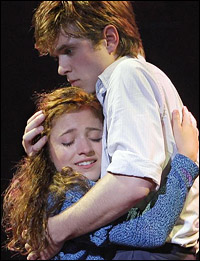
*
Spring Awakening, now on a national tour, is one of Broadway's most unlikely success stories. Based on a very dark and controversial 1891 German play by Frank Wedekind, the musical explores teenage sexual desire and the consequences of living in a repressive society. It features a cast of unknowns and was written by a pair of musical theatre novices, the pop singer–songwriter Duncan Sheik (music) and playwright Steven Sater (book and lyrics). Its target audience consists of teenagers and young adults, two groups not exactly known for their theatregoing habit or their disposable income. And although the show's premiere engagement at Off-Broadway's Atlantic Theater Company not only sold out but was extended, filling a 165-seat house is not the same as filling a Broadway theatre. Sater recalls that when the producers decided to make the move uptown, they called it a "suicide mission."
They couldn't have been more wrong. Critics raved, audiences of all ages were enthralled, and the show earned eight Tony Awards — including Best Musical — in 2007. In fact, Spring Awakening accomplished precisely what Sater hoped it would. "My determination was to touch the troubled heart of young people around the world," he says. "That was my impulse in writing it."
Sater first thought about writing a musical after he and Sheik collaborated on a couple of songs for his play Umbrage. He says that Sheik was willing, with a caveat. "Duncan said, 'I'd want to create something in which the music was relevant to the culture at large.'" Immediately, Sater thought of Spring Awakening. "I can only tell you it was a deep instinct, a profound impulse. It was 1999, and everyone was thinking millennial thoughts. And I thought, 'What a great way to look forward — by looking backward.' The original play is full of such longing and the hopes and aspirations and anguish of being young. For generations, young people have found a release from and an expression of those same yearnings in rock music. I could hear Duncan's music in the play."
Sater knew what kinds of songs he wanted to write, and didn't want to write. "I wanted the songs to function as internal monologues," he says. "We would go into this timeless place, into the hearts and minds of these young people. I didn't want to write lyrics that would further the plot; I never liked those kinds of songs. Over time it became clear that we would keep the story in the 19th century, but when we would go into the song world, we would step out into the present day. Then the very structure of our piece would comment on the sad timelessness of our theme: We're still not listening to what's in the hearts and minds of young people, and we're taking their childhood from them by not respecting them." The piece "took on an urgency" for Sater in the spring of 1999, following the attacks at Columbine High School. He called Michael Mayer, who not only agreed to direct, but said that the night before, he'd talked about his desire to work on something substantial — specifically, Spring Awakening.
| |
 |
|
| Christy Altomare and Kyle Riabko | ||
| photo by Paul Kolnik |
"We also created a different character in Wendla, because I wanted her to be meaningful to young women today," Sater continues. "So, for example, in the first scene, Wendla asks her mother how babies are born, and her mother is silent. In the play that scene happens much later, and is a very different take. I wanted to create a girl who is a searcher, who wants answers, who is frustrated trying to get these answers. I wanted to understand where she's coming from, what she's yearning for."
Just how much Spring Awakening resonates was never more apparent than when the national tour officially opened in San Francisco in September 2008. The presidential campaign was dominating the news, and much of the buzz was about the governor of Alaska and her family. In Spring Awakening, a bewildered Wendla is told she's pregnant; she doesn't understand how it's possible. "A child? But I'm not married!" she says.
"When Wendla said those words," says Sater, "everyone started to laugh. Then they cheered. Then it was like an ovation, that we were putting this out there. It couldn't have been more timely. That's why I wanted to write the show. I wanted to be part of the culture and have a voice."


Evan-Zimmerman-for-MurphyMade.jpg)






